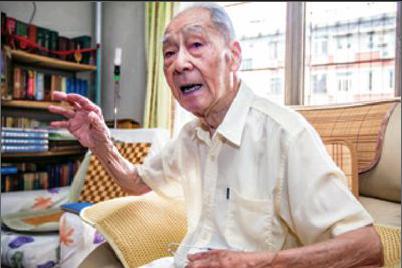Building Linguistic Bridges
2014-09-15ByyanWei
By+yan+Wei

Shelves of books, a computer, and perhaps most importantly, a creative mind—these are what Xu yuanchong, an awardwinning Chinese translator, counts on when creating literary ties between speakers of Chinese, English and French.
Xu, 93, has published more than 100 translated novels, anthologies and plays in the three languages, reaching potentially millions of readers at home and abroad. His most recent project is a new Chinese version of William Shakespeares 40-volume collection, which he plans to finish in five years.
“I want to surpass all previous translations in accuracy and beauty,” Xu said.
The International Federation of Translators(known by its French acronym FIT) has recently awarded the prolific translator for his contributions to cross-cultural exchanges. at a congress in Berlin on august 2, the FIT granted Xu the 2014 aurora Borealis Prize for Outstanding Translation of Fiction literature, which according to the federation “signifies recognition of the ‘best of the best by ones peers around the globe.” The award came at the culmination of Xus decades-long pursuit of excellence in translation. He is the first asian translator to have received the honor since its inception in 1999.
Unable to attend the award ceremony, Xu commented on the prize from his Beijing home, saying, “The FIT award is not just for me, but gives prominence to the value of Chinese culture.”
Narrowing gaps
Xus career as a literary translator dates back to his college years. In 1939, as a student at the National Southwestern associated University in Kunming, southwest Chinas yunnan Province, he published an English translation of a poem by female architect and writer lin Huiyin titled Do Not Throw Away.
He has since developed his own translation style, characterized by making his adaptations readable and relatable to the target audience by changing the initial wording when necessary. In his view, a translation should be as beautiful as or even more so than the original.
Xu started to practice this new approach to translation in the early 1940s when he worked as an interpreter with the Flying Tigers, a U.S. volunteer air force based in China during World War II. at a reception for U.S. pilots, he translated Kuomintang founder Dr. Sun yat-sens Three Principles of the People, the partys guiding ideology for which an English equivalent is notoriously difficult to find, into “of the people, by the people, for the people,” a reference to U.S. President abraham lincolns famous statement in the Gettysburg address.endprint
Most notably, he has translated classical Chinese poems into rhymed verses in both English and French. His translations range from Book of Poetry, the oldest Chinese poetry collection that features works from the 11th-6th centuries B.C., to late Chairman Mao Zedongs poems.
as he works to introduce Chinese classics to the West, Xu finds that time-honored Chinese wisdom could make an impact on Western societies and the world at large. For instance, a 1,200-year-old poem titled Fishing in Snow may even have helped U.S. President Barack Obama win over a Republican senator on his controversial healthcare reform, according to Xu. The poem reads:
From hill to hill no bird in flight;
From path to path no man in sight.
A lonely fisherman, behold!
Is fishing, snow on river cold.
The senator might have been so impressed with the fishermans independent, non-conformist thinking after reading the poem that he might have opted to part with the party line to support Obama, Xu argued. The proof: Obama sent a thank-you letter to Frank Xu, Xus son and a freelance translator in the United States, who e-mailed the poem to the Republican senator in question.
Independence is one of the many highly valued traits in traditional Chinese culture, and so is love of peace, Xu noted. another poem he transcribed, originally written in the Western Han Dynasty (206 B.C.-a.D. 9), goes:
At her first glance soldiers would lose their town;
At her second a monarch would lose his crown.
How could the soldiers and monarch neglect their duty?
For town and crown are overshadowed by her beauty.
While the Chinese were willing to abandon a town and even an entire kingdom for a beauty, the ancient Greeks waged a bloody, protracted war with the Trojans after the latter stole away with Helen, considered the most beautiful of all women, from her husband, the Greek hero Menelaus, Xu said, referring to the Trojan War in Greek mythology.
“This inherent aggressiveness, which urged Westerners to fight for their interests and helped build strong empires, is starkly absent in Chinese culture,” Xu said.
Championing innovation
Unlike most office workers, Xus typical workday starts at around 9 p.m. and lasts until the wee hours of the morning, sometimes even through dawn. He enjoys physical activities such as biking and strolling.endprint
Xu said that translation gives him a great sense of fulfillment and he is determined to persist in it despite his advancing age. as a rule, those who take a deep interest in their career are most likely to succeed.
Indeed, Xu has reason to take pride in how far he has gone in his beloved career. after reading his English translation of Selected Poems of Li Bai (1987), the late Chinese scholar Qian Zhongshu commented, “If Xu had lived in the same age as li Bai, they would have become good friends.” li was one of the highest-achieving poets in the Tang Dynasty (618-907).
In 1994, British publishing company Penguin Books launched Xus Songs of the Immortals—An Anthology of Classical Chinese Poetry in Britain, the United States, Canada, australia and several other countries, making him the first Chinese translator to have his works printed by the renowned publisher. In 2010, the Translators association of China conferred on Xu the lifetime achievement award in Translation.
But his approach to literary translation, expounded upon in a series of monographs on the subject, has been a matter of heated debate in academic communities. While Xu regards literary translation as an art that calls for re-creation and innovation, some academics prefer treating it as a science, producing a strict equivalent of the original. They believe that translators should write as if they are “wearing a straightjacket,” restraining them from deviating from the original text. Critics have questioned Xus use of Chinese idioms in translations, accusing him of resorting to clichés, or have fully rejected his liberal approach.
Still, Xus works remain popular with publishers and readers alike. yu Xiaoqun, President of Beijing-based Dolphin Books, a publisher of his works, said, “Xu is a translator with a distinctive style. He has broken many shackles that have long restricted translators. Though debates about his translation style continue, his works are well received overseas.”
One of Xus greatest achievements is spearheading the Chinese theory of literary translation, said Zhang Xiping, a professor at Beijing Foreign Studies University. In Xus opinion, the “dynamic equivalence” advocated by Western translation theorists applies to adaptations between European languages, in which 90 percent of words are similar. That theory, Xu believes, may not work as well when it comes to Chinese, as more than 50 percent of Chinese words do not have equivalents in Western languages.
“The prime reason Xu has challenged Western theories is that he is, before all else, a translator—a master experienced in rendering Chinese into foreign languages and the other way around,” Zhang said.endprint
